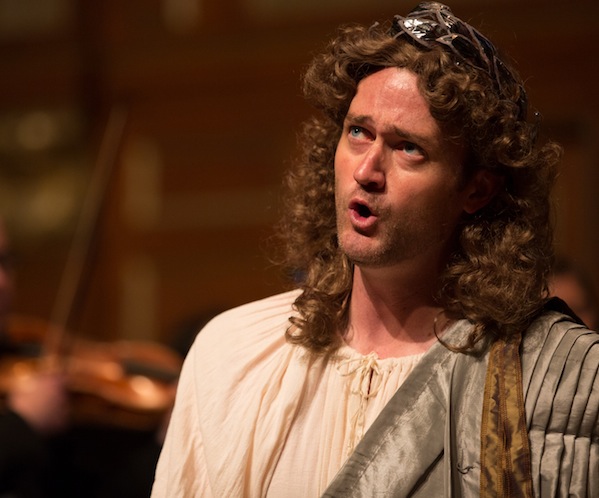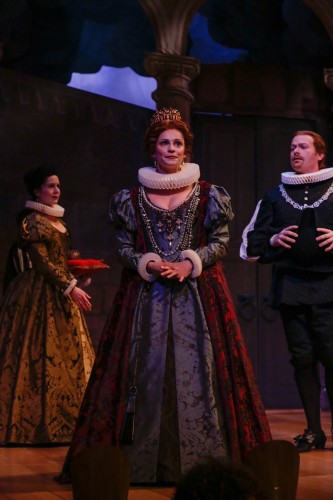Concert Review: Boston Early Music Festival’s Glorious Highlights
The more I hear performed by the BEMF, especially their operas, the more deeply impressed – and thankful – I am.

Aaron Sheehan performing the title role of Charpentier’s Orphée at the 2013 Boston Early Music Festival. Photo: Kathy Wittman.
By Susan Miron
For many, the annual Boston Early Music Festival opera on Thanksgiving weekend is as eagerly anticipated as Thanksgiving itself. I became addicted to spending part of the holiday experiencing the musical grandeur that the BEMF operas provide four years ago. Now I wouldn’t miss these operas for the world. This year’s offering – “Glorious Highlights from BEMF’s First Five Chamber Opera Productions“- was highly anticipated as one of The Early Music Events of The Year. It actually surpassed these high expectations.
For those who had enjoyed the pieces before, it was a welcome chance to hear them again with the original excellent singers. For those who were new to BEMF operas, it must have been a revelation. All of the singing, both solo and ensemble, was of the highest caliber as was the 13 member instrumental ensemble, led by BEMF music directors Steven Stubbs and Paul O’Dette.
The BEMF November opera “tradition” began in 2008, as did the seven operas chosen for the Gala. Advertised as featuring a line-up of BEMF all-star “favorites,” the Gala delivered in spades. The opening number was the perfect opener: the Prologue from Monteverdi’s Orfeo (2012) with La Musica sung by the beloved Amanda Forsythe, a BEMF favorite (she all but stole the show last June in Handel’s Almira). As Ellen Harris, the excellent lecturer (Professor Emeritus at MIT) explained, La Musica is the character who draws the curtain on the history of opera. Many of the original performances took place, Harris added, in the private homes of aristocrats. Boston’s Jordan Hall worked its usual magic: if you were sitting close to the stage, it would not be hard to imagine being in a fabulous home.
Harris also noted that most of these operas take place in the woods or in nature, where things are much freer, sexually and otherwise. Yet danger lurks. One character after another will venture blithely to Arcadia and eventually suffer a disaster. For instance, Euridice is bit by a poisonous snake and dies. “We may think we are the hunter,” she suggested, “but we are the hunted.” Most of the soloists, she added, were male castrati.
The lovers in Dido and Aeneas (2010) by England’s highly esteemed Henry Purcell “could never have met,” Harris observed, “they lived centuries apart.” Virgil wrote it and “was NOT good to Dido. It wasn’t Aeneus who ruined her reputation. It was Virgil!” This opera was first performed by a girls’ boarding school, an ironic location given that it is story of a female killing herself after having a one-night stand. This excerpt featured a beautiful duet between the two lutenists, O’Dette and Stubbs, who were playing Baroque guitar and theorbo. It’s hard to not keep singling out Amanda Forsythe, who played the role of Belinda, and Douglas Williams, who sang Aeneus’s solo beautifully. The spirit was Zachary Wilder, who is alway excellent. And so it went, opera except after opera excerpt. The singing was fabulous and the BEMF Chamber Ensemble terrific.
John Blow’s Venus and Adonis (2008) is actually a precursor to Purcell’s opera. Here the two Baroque oboes set the pastorale mood perfectly. Danielle Reutter-Harrah as Cupid sung soaringly. The piece ends with “Mourn for the Servant,” which was sung by the BEMF Vocal Ensemble, all in gorgeous voice. It was the saddest music I’ve heard in a long time. This opera was also performed at Josias Priests’s (girls) school in 1684. Venus was then performed by King Charles II’s former mistress, Mary Davis, and Cupid was played by their daughter, Lady Mary Tudor, not yet ten years old.

Ulrike Hofbauer and cast in Handel’s “Almira” at the 2013 Boston Early Music Festival. Photo: Kathy Whitman
Actéon (2008) is one of the three operas by Marc-Antoine Charpentier performed on Sunday. Its plot is convoluted: its most memorable scene featurs Prince Actéon transforming into a stag and being torn apart (and, I would guess, eaten) by his own hunting dogs. The star of this performance was Teresa Wakim, who has a big voice and lovely stage presence. Her character, Diane, is responsible for the revenge/death of poor Actéon.
George Frederic Handel’s Acis and Galatea (2009) (version of 1718), with a libretto written by a trio that included Alexander Pope, featured Teresa Wakim as Galatea along with the poised, lovely voiced Aaron Sheehan and the forceful bass-baritone Douglas Williams as Polyphemus. Williams was my big discovery on Sunday: I look forward to hearing him again. Zachary Wilder had a solo accompanied by a lone violin, then oboe. The performance was gorgeous. While the plots are convoluted and would take pages to explain, the music on Sunday was refreshingly uncomplicated and beautiful, no matter how difficult it is to play!
Two other Charpentier operas ended this glorious afternoon, La Descente f’Orphée aux Enfers (2011) and La Couronne des Fleurs (2011). Aaron Sheehan re-impressed as Orphée, and Teresa Wakim was again very good in La Couronne. Many of these operas have been recorded, and if you missed this concert they are well worth looking for. Of course, what you will miss is the choreography, the costumes, and Gilbert Blin’s magnificent direction. I have neglected to mention one of my favorite singers, tenor Jason McStoots, who, along with Douglas Williams, was in all five BEMF Chamber Opera Series productions. McStoots has more personality and charm than a roomful of other tenors, and he enlivens whatever production he is in. Bravos to all. The more I hear performed by the BEMF, especially their operas, the more deeply impressed – and thankful – I am.
Susan Miron, a harpist, has been a book reviewer for over 20 years for a large variety of literary publications and newspapers. Her fields of expertise were East and Central European, Irish, and Israeli literature. Susan covers classical music for The Arts Fuse and The Boston Musical Intelligencer. She is part of the Celtic harp and storytelling duo A Bard’s Feast with renowned storyteller Norah Dooley and plays the Celtic harp at the Cancer Center at Newton Wellesley Hospital.
